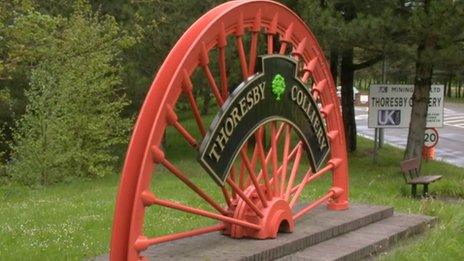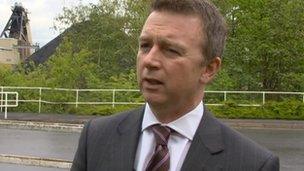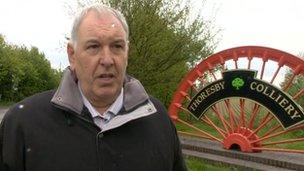Political pressure to save Britain's last coal mines
- Published
- comments

When King Coal ruled and dominated Britain's industrial landscape in the middle of the last century, there were 1,000 pits employing 750,000 miners.
Nottinghamshire - one of the most productive coalfields in Europe - had 47 collieries.
Thoresby pit in the heart of Sherwood Forest is all that remains of a once proud industrial tradition. Now Nottinghamshire's last colliery and the jobs of its 700 miners is in doubt.
That's because of a huge underground fire at a similar deep coal mine 60 miles further south.
Daw Mill Colliery in north Warwickshire has been forced to shut. Several hundred miners have been laid off.
It was the biggest mine owned by UK Coal, the country's largest coal producer. Daw Mill was its money-spinner.
UK Coal's chief executive Kevin McCullough is now battling to preserve the business.

UK Coal's chief executive Kevin McCullough said the priority was to save existing jobs
"Given it was the most furious blaze in 30 or 40 years of UK mining, we had no option but to close that mine permanently," he told me.
Coal still accounts for generating 40% of the country's electricity needs.
But uncertainty over the future of UK Coal has knock-on effects for Thoresby and at Kellingley in North Yorkshire, the firm's two other big mines.
Any rescue plan will affect the remaining workforce and the pensions of thousands of retired miners who used to work in the East Midlands coalfield.
I met up with Alan Bell, who has worked at Thoresby as a fitter since he left school 40 years ago. He fears losing thousands of pounds from his works pension.
"It's really concerning," he said.
£360m funding gap
"I've worked out a loss of about £20,000 to £30,000 in my total pension. As far as retirement is concerned, it's a no-no now."
Andrew MacKenzie was fortunate after the blaze at Daw Mill to get a transfer to Thoresby. But he too worries about big reductions to his pension pot.
"Of course, we are angry but if you want a job, you've got to take a cut one way or another haven't you," he told me.
The closure of Daw Mill not only seriously affects the output of UK Coal but also its ability to continue funding its company pension scheme for its 6,800 members.
Industry experts estimate the funding gap could total £360m.

Mick Stevens from Nottinghamshire's UDM wants the government to do more to help
Kevin McCullough is quite clear on his priorities now.
"We are doing our hardest to secure the existing jobs and benefits of our employees.
"Clearly a pension is a big part of that. It's not lost on us. That's why we are working with lots of departments in the government to safeguard that to the fullest extent we can."
Those talks with ministers include the possibility of Daw Mill and the pensions scheme being taken over by the government and the state-run Coal Authority.
If the pension scheme is bailed out by the government, payments to retired miners won't be nearly as generous.
Mick Stevens, the general secretary of the Nottinghamshire Union of Democratic Mineworkers, is pressing coalition ministers for an early decision.
"There's just too much uncertainty over jobs and the pension," he said.
"The government and local MPs can do a lot more to help. We need more communication to get the assistance and not just talk."
In Parliament, Bolsover MP Dennis Skinner has raised his concerns over the very future of coal mining in this country.
Safeguard jobs
He warned it could cost the government up to £500m in pension and redundancy payments if UK Coal is no longer viable.
"It would make a lot of sense for this coalition government to save what's left of the coal industry and nationalise it," he told the House of Commons.
Kevin McCullough says the priority has to be saving existing jobs.
"The most important point is that we safeguard the 2,000 jobs we have and look after our creditors.
"We need to do that so we retain a viable mining business.
"Where that ends up is still not clear, but we are working very hard to get there."
There's been coal mining at Thoresby for 90 years.
One question now: will Nottinghamshire's remaining pit see out its centenary?